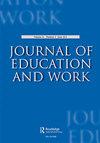Geography-mediated institutionalised cultural capital: regional inequalities in graduate employment
IF 1.7
Q2 EDUCATION & EDUCATIONAL RESEARCH
引用次数: 0
Abstract
ABSTRACT This article investigates how regional inequalities shape the employment seeking experiences and behaviour of graduates by drawing on the case of Chinese Master’s graduates under COVID19. Based on interviews with graduates who chose to work as the ‘targeted selected graduates’ (TSG) of University A, located in the underdeveloped regions of North-western China, we show how their employment seeking was jointly impacted by three different but inter-related fields, the national economic, higher education, and graduate employment fields. These students were situated in a unique juncture across these fields; while their elite credentials from University A qualified them for these elite TSG programmes, they were disadvantaged by being excluded from TSG recruitments at economically developed regions. Importantly, we highlight that institutionalised cultural capital in the form of academic credentials from elite HEIs does not work in a ‘straightforward’ manner, but it has to be considered in conjunction with the geo-economic locations of their HEIs. We, therefore, propose the notion of ‘geography-mediated institutionalised cultural capital’ to capture this significant but under-theorised aspect of the graduate employment scene. This conceptual innovation enlightens the analysis of regional differences in different countries by considering how official or unofficial regional authorities’ interventions shape graduate employment.地理中介的制度化文化资本:毕业生就业的地区不平等
本文以新冠肺炎疫情下的中国硕士毕业生为研究对象,探讨了地区不平等对毕业生求职经历和行为的影响。本文通过对西北欠发达地区A大学“定向毕业生”(TSG)毕业生的访谈,揭示了国民经济、高等教育和毕业生就业这三个不同但又相互关联的领域是如何共同影响他们的就业的。这些学生正处于这些领域的一个独特的结合点;虽然他们从A大学获得的精英证书使他们有资格参加这些精英TSG项目,但他们却被排除在经济发达地区的TSG招聘之外,处于不利地位。重要的是,我们强调,精英高等教育机构的学术证书形式的制度化文化资本并不能以“直接”的方式发挥作用,但它必须与高等教育机构的地缘经济位置结合起来考虑。因此,我们提出了“地理介导的制度化文化资本”的概念,以捕捉毕业生就业场景中这一重要但未被理论化的方面。通过考虑官方或非官方地区当局的干预如何影响毕业生就业,这一概念创新启发了对不同国家区域差异的分析。
本文章由计算机程序翻译,如有差异,请以英文原文为准。
求助全文
约1分钟内获得全文
求助全文
来源期刊

Journal of Education and Work
EDUCATION & EDUCATIONAL RESEARCH-
CiteScore
2.70
自引率
14.30%
发文量
40
期刊介绍:
The Journal of Education and Work is an international forum for academic research and policy analysis which focuses on the interplay of the education and economic systems. The journal examines how knowledge, skills, values and attitudes both about and for work and employment are developed within the education system. The journal also explores the various forms of industrial training and accreditation in the economic system, including changes in the economic and industrial infrastructure which influence the type of employees required. Work in the informal economy is also included.
 求助内容:
求助内容: 应助结果提醒方式:
应助结果提醒方式:


